Hollywierd is and really always has been the sort of epicenter of crazy situations, not to mention scandals. The overheated, over-hyped and over-dramatic people who either flock there or are drawn there seemingly just can't help but become caught up in the melee. And over the years, more than a few sensible performers have instead opted to live elsewhere and commute to Tinseltown only when necessary. But in the golden era of movie-making, sometimes it wasn't just the misbehavior of the stars themselves that generated jaw-dropping scenarios, but the studio heads with their chess-like, behind-the-scenes engineering, who helped fuel head-shaking acts. Today's Tinseltale falls mostly in that vein. It concerns the sunny star of MGM comedies and musicals, Van Johnson.

Johnson, only child to an alcoholic, absentee mother and a spartan, distant father, headed from his Rhode Island home to The Big Apple while still in his late teens in order to pursue a stage career. Soon enough, he was dancing in Broadway shows and understudying the leads in productions such as Too Many Girls with Desi Armaz and Pal Joey, which starred Gene Kelly. He was brought to California to dance in the film version of
Too Many Girls (1940), during which he met Lucille Ball, who became a key friend. (She also fell in love during the film with leading man Arnaz, leading to a momentous marital pairing on and off screen.) Ball was responsible for introducing Johnson to a casting director who opened the door for studio screen tests. Johnson first signed with Warner Brothers, but was ultimately all wrong for the home of gritty gangster/crime flicks, which were its bread & butter. He only appeared in one feature and one short. Fortunately for him, MGM picked him up and began to groom the still unseasoned actor with their battery of on-site classes.
Even MGM, though, had not yet realized his potential for musical roles. Then again, the year was 1942 and the US had just suffered the bombing of Pearl Harbor, leading the country into the thick of WWII. Morale-building propaganda films were much the order of the day and so Johnson's first turn before the cameras was
Somewhere I'll Find You (1942), a three-cornered romance set partly against the Japanese invasion of the Philippines. In real life Clark Gable lost his beloved wife Carole Lombard just as filming had begun (her plane crashed as she was heading home from a war bond drive) and he would enlist in the army directly after its completion. Johnson showed up near the climax as a soldier fending off the oncoming enemy the best he can.

For this sequence, Johnson was paired with a newcomer to films, making his big-screen debut. The actor in question was one Keenan Wynn, son of vaudeville, Broadway and radio star Ed Wynn. (The young actor's unusual first name came courtesy of his mother, Hilda Keenan, who was an actress herself.) The two young men had instant chemistry with one another. Only one month apart in age, they soon established a camaraderie at their shared dreamland of a movie studio. Wynn had been married since 1938 to a highly dynamic, ambitious fellow performer, Evie Abbott, who had helped steer her new husband's career in the right direction, offering advice and moral support along the way. They had one son together, Ned, and would produce another one Tracy Keenan, by 1945.

Despite their nearly identical age, Wynn and Johnson were hardly alike in terms of looks or performance style. Johnson was soon being molded into the bright, wholesome leading man type while Wynn had darker, more malleable looks along with a wide gallery of facial expressions that proved him adept at virtually any sort of role from the comic to the threatening and everything in-between. He was destined to become a skillful, but rarely above-the-title, character actor.
While Wynn continued to show his versatility in supporting roles, Johnson was soon being featured in
Dr. Gillespie's New Assistant (1942) and
Dr. Gillespie's Criminal Case (1943), which were part of the highly successful
Dr. Kildare series. The star of those, 34 year-old Lew Ayres, was in the midst of being drafted into the military where he drew some degree of controversy over declaring himself a conscientious objector. (He did, though, serve more than three years as a medic and earned three battle stars in the process.) Johnson, who was 26 and unmarried, didn't show any interest in joining the cause and worked steadily in movies as the war continued. But that would soon become a moot point in any case.
In what was certain to count as a career boost, Johnson was cast alongside one of the movies' top stars, Spencer Tracy, and popular leading lady Irene Dunne in
A Guy Named Joe (1943.) In the middle of filming, though, Johnson was involved in a tremendously harmful automobile accident, which damaged his head and face. He was threatened with replacement, but Tracy, who'd taken a shine to the young actor, along with Dunne insisted that the production be halted for three months until Johnson could complete the movie. So he was able to hold onto the part (in a top ten movie of that year), but forever after had a steel plate in his head as well as some scars which could only be partially repaired. (You can see some of the unretouched remnants of this in the color photo at the top of this post.)

During his considerable convalescence, Johnson resided with Keenan and Evie and young Ned. As he began to come out of the worst of his injuries, the popular movie rags of the day took advantage of the publicity opportunities that this threesome afforded. Here, the two gents are haranguing her over some burnt toast. Johnson and Wynn had become the closest of friends and Wynn's wife was in their swinging as well. But were they by some chance
swinging...?? Speculation began to arise, not squelched by the times a still-single Johnson used his best pal's wife as an escort to shindigs and premieres or parties at The Wynn's with Johnson and Wynn clipping flowers together and Evie giving Van birthday whacks on his rear end.
Even Wynn's famous father Ed had a devil of a time figuring out the situation. He was once (in)famously quoted as saying, "I can't keep them straight. Evie loved Keenan. Keenan loves Evie. Van
loves Evie. Evie loves Van. Van loves Keenan. Keenan loves Van."
Meanwhile, Johnson and Wynn began to appear in several MGM movies together. Wynn had a supporting part in the latest in the Gillespie series,
Between Two Women (1945) and they were both featured in
Weekend at the Waldorf (1945.) Soon, though, they began to play off the notoriety of their interpersonal relationship in light comedies of misunderstanding, typically ending up in a battle over the same feminine love interest.
 |
Weekend at the Waldorf was a more lighthearted, postwar rendition of the 1932 sensation Grand Hotel.
|
In 1946 came
Easy to Wed, another remake (this time of
Libeled Lady, 1936.) Johnson had done
Thrill of a Romance with Esther Williams the year prior and it was a smash, so the two were reunited here. At this stage, Johnson was top-billed and his mentor and pal Lucille Ball was placed third in the credits! As this movie entered production, Wynn was involved in an accident of his own. He'd crashed his motorcycle, had his jaw wired shut for a month and lost 30 lbs. This time it was Johnson's loyalty that could ensure he wasn't replaced. He was back on set in a month.
The seemingly inevitable co-starring film with Johnson and Wynn came in 1946's
No Leave, No Love. No matter what the situation, real or imagined, between these two pals, there's no question that the publicity stills of the time, innocent as they might have been, lend a hilariously suggestive tinge to the relationship now.
And things were about to become dicey. I mean seriously dicey. Johnson was the idol of countless young movie fans. They couldn't wait to see him on screen and read about him in movie magazines. He was MGM's golden boy. But at 31 for him to still be unmarried in the 1940s was something of a red flag. And... much to studio head Louis B. Mayer's dismay, he'd been discovered in some compromising homosexual situations, which the lion-like Mayer successfully kept out of the press. Something had to be done. And done fast.
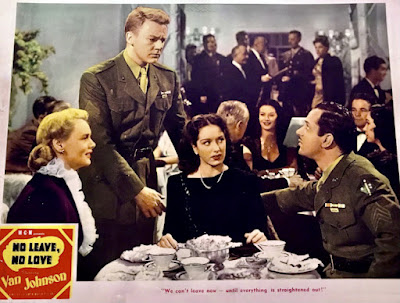 |
"We can't leave now... until everything is straightened out!"
|
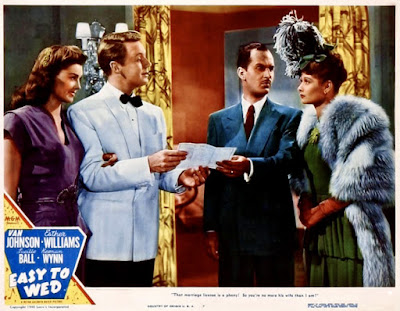 |
"That marriage license is a phony! So you're no more his wife than I am!"
|
Mayer wanted Johnson to be married. ASAP. Not only did he not wish to be married, there was no woman in Hollywood to whom he would even consider wedding... except for Evie Wynn! Finally, Evie was called into Mr. Mayer's office for a life-altering meeting. The offer was on the table. If she divorced Keenan, the father of her two sons, Keenan's contract would be renewed with added perks, ensuring security for their children. She'd also be "trading up" in terms of her own position as the wife of an A-List leading man with a well-paying contract of his own. It took the better part of a year for her to make a determination about it (or for the three of them to!), but in 1947 she and Wynn drove to Mexico for a divorce and four hours later, she was Mrs. Van Johnson.
 |
"Remember, she may be your wife, but she's engaged to me!"
|
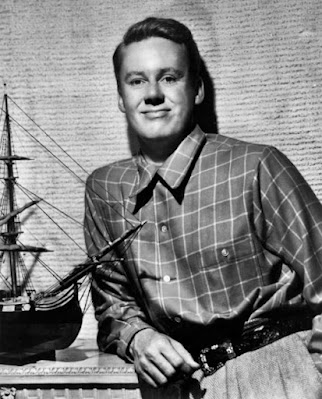 |
Suddenly things were ship-shape.
|
It's almost surreal sounding. Not that a Hollywood star would wed the moment a divorce became final - that was nearly common! But that a star would marry the wife of his best friend and that they'd continue to remain friends. And it also would seem a risk that the public might decry this and spoil the star's image that the action in question was designed to uphold. But the result was that Van and Evie Johnson became a popular couple in the film capital. They were out and about constantly while also hosting lavish get-togethers of their own.
 |
Good Lord...! Of all couples to be hanging with, Barbara Stanwyck and Robert Taylor. Babs admires Evie's ring while Van admires Barbara's husband!
|
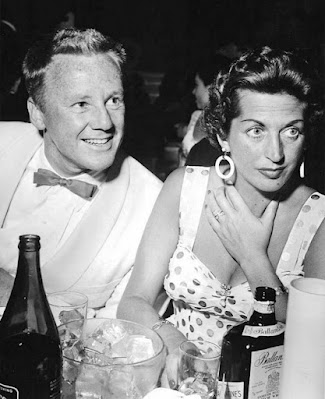 |
As you can see, booze with plenty of ice was also the order of the day!
|
 |
If I'm being frank, I always thought that Evie Wynn Johnson looked more like her (ex) father-in-law Ed Wynn than Keenan did! If Ed was baffled before, he was surely confused now.
|
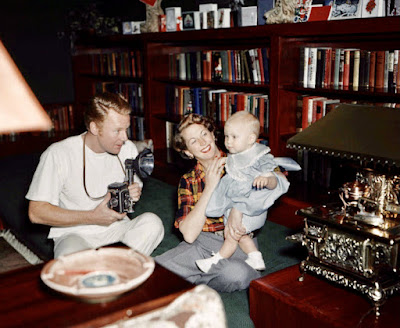 |
But, for some amount of time anyway, the marriage was a real one and a seemingly happy one. The newly-formed couple produced a daughter together, Schuyler Johnson, in 1948. The picture-perfect image was captured by the publicity department and all the ever-present movie magazines.
|
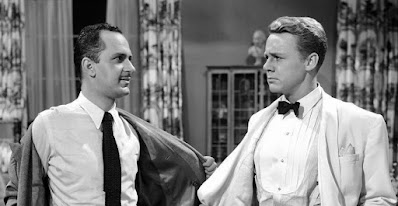 |
Whatever the situation, whatever deal was struck, both men's careers continued to flourish.
|
 |
Wynn amassed a staggering number of movie and TV credits. When his famous father ran into career despair after his zany, costumed persona faded out of fashion, he helped encourage him to try more conventional acting. They worked together on Playhouse 90, among other shows, and the elder Wynn gleaned an Oscar nomination for his work as the cranky dentist Dr. Dussel in The Diary of Anne Frank (1959.) Hugh Griffith won that year for Ben-Hur.
|
Johnson, meanwhile, proceeded to costar in hits like
The Bride Goes Wild,
State of the Union,
Command Decision (all 1948),
In the Good Old Summertime,
Battleground (both 1949) and many more. He and Wynn even reunited on film in 1954's
Men of the Fighting Lady, a successful Korean War naval picture. That same year, Johnson changed gears in order to play a far more serious role than he was typically called upon to portray in
The Caine Mutiny.
 |
Right back where they'd begun a dozen years prior in Somewhere I'll Find You. Wynn and Johnson, side by side and in uniform for Men of the Fighting Lady.
|
1954 was a pretty sterling year for Johnson as not only did he have
The Caine Mutiny, but there was also
The Last Time I Saw Paris, a considerable hit opposite Elizabeth Taylor, and
Brigadoon, a popular musical with Gene Kelly, who he'd once been understudy to back in NYC. (This same year, his mother came out of the woodwork to demand financial support, which he agreed to pay despite her absenteeism during his childhood. An out-of-court settlement of $400/month was agreed upon.) He continued to make movies through the late-'50s, acting for the first time on TV as well in a 1955 episode of
I Love Lucy in order to repay his longtime pal Lucille Ball (playing himself.) His MGM contract now over, he worked at various studios, took part in productions overseas and headlined the first made for TV movie, 1957's
The Pied Piper of Hamlin. As the 1960s dawned, Johnson began to work steadily on stage, appearing in productions of Bye Bye Birdie, Damn Yankees, Guys and Dolls and...
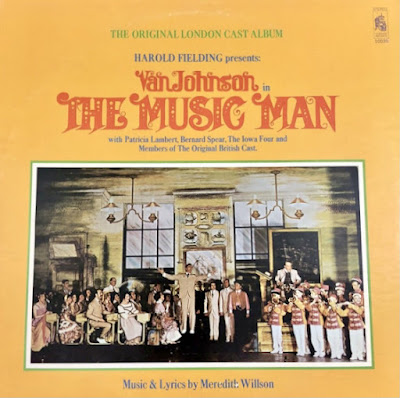 |
...in 1961, Johnson found great success in the London production of The Music Man, eventually touring it all over the place for nearly two years.
|
By this time, signs of rust had begun to appear of the marriage of Van and Evie Johnson. There had been some squabble, some separation and a general air of malaise within the situation as it existed. Regardless of the built-in issues, the couple repeatedly tried to make a go of it (and remained popular as both hosts and guests at many Tinseltown events.) Evie joined Van during his stint as Professor Harold Hill, which might have led to a happier period in their relationship except...
 |
He left her for another man. He took up with one of the male dancers in The Music Man and that was the final nail in the coffin of his marriage. This other man is never (?) named that I can find, but I can tell you that Ben Stevenson, a noted ballet dancer-turned-instructor (seen just under Johnson's arm in the pale suit) grew close to Johnson during the run and was part of his inner circle. He was one of a select few cast-mates to get to dine with Judy Garland when she was in town.
|

Thus followed a highly acrimonious divorce, with the once seemingly happy couple going to the mat over the various details of their marriage dissolution. The situation dragged on until 1968! Keenan Wynn, meanwhile, had wed for a second time (1949-1953) and finally a third (in 1954), which lasted until his demise in 1986 and produced three more children. Evie and Keenan's son Ned, a sometime actor and screenwriter, eventually wrote a funny/sad book about growing up in such unusual circumstances. Their other son Tracy became a successful screenwriter (of
The Longest Yard, 1974, and
The Deep, 1977, among others.) Though there had been some ups and downs along the way with her father, Evie and Van's daughter also produced a book of her mother's photos from their time in Hollywood with anecdotal commentary to go with.
Wynn's motion picture and TV resume was nothing short of staggering. He remained a busy character actor in movies like
The Patsy (1964),
The Great Race (1965),
Point Blank (1967),
Finian's Rainbow (1968),
Pretty Maids All in a Row (1971) and many, many others. He also had a memorable run on
Dallas as Digger Barnes and was a guest on countless hit programs (including the inevitable
The Love Boat, as seen here with Henry Gibson.) He died in 1986, still working regularly, of pancreatic cancer at age 70 and doubtlessly would have acted for far longer had he not become ill. He had three daughters with his third wife, one named Hilda after his own mother. His granddaughter, Jessica Keenan Wynn, continues the more than 100-year family tradition today as an actress of stage and screen.
Johnson kept busy as well with the occasional movie such as
Wives and Lovers (1963),
Yours, Mine and Ours (1968, again with Lucille Ball) and
Where Angels Go, Trouble Follows (1968) along with many TV-movies and guest spots on his shows. (He's seen here with
Ray Danton during an installment of
McCloud.) He also continued to work on stage in things like How to Succeed in Business Without Really Trying, No, No Nanette and Showboat. He spent nearly a year on Broadway as a replacement Georges in La Cage aux Folles in 1985. Retiring in 1992, he passed away of natural causes in 2008 at age 92. Evie had passed away four years prior at age 90 after breaking a hip. Neither of them had wed again after the end of their own union.
 |
It's unlikely that we'll ever truly know the extent of what did or did not transpire between instant best friends Johnson and Wynn. Their unusual circumstances certainly raised eyebrows in the 1940s. I can say on a personal note that I have had many heterosexual married male friends and nothing ever happened between us (and I've never taken one of their wives as my own! Ha ha!)
|
 |
I do think it's safe to say, however, that no matter the reality of the situation, there was indeed a deep and profound affection between these two men. It comes across in countless candids and even in staged photos with other people present. In a dog-eat-dog town like Hollywood, real friendship can mean everything when the chips are down.
|
 |
| "A couple of keyhole snoopers see eye-to-eye!" |
|



















































14 comments:
Hi Poseidon,
"Papa" L.B. Mayer sure had his hands full with his dysfunctional MGM family! Closet gays, drinkers and druggers, and multi-marriers, oh, my!
Seriously, I know Van Johnson lost at least one fan when he married his best friend's wife. My late pal Alice was a young woman and major movie fan during Hollywood's golden era. Alice told me that she adored Van but never felt the same about him after he "broke up" the Wynns' marriage. Says something that L.B. Mayer knew that middle America would accept Van more as a heartbreaker than a homo!
And L.B. had more than a couple of closet cases at Metro...
As for me, while I can see why Van was so appealing, he reminded me a bit of Tony Curtis as he got older, imperious and full of himself, and blaming others for his shortcomings.
A fascinating story that would make a great movie!
Cheers, a great read...
Rick
Well written, very, and you kind of blew my mind on this one. The child of Van Johnson and Evie surprises me but I guess anything is possible. Lucy seems pretty gay friendly to me. I have always had the biggest crush on Keenan Wynn. Something about that gruff Daddy voice makes me wild. I still think his Dad was a very odd talent (am thinking of Mary Poppins and that crazy scene). Great stuff here!
Fascinating stuff. Hollywood was indeed the strangest place on earth for a while, and my god do we love so for it. The idea of Mayer just waving his golden scepter over people like puppets is rather staggering to think about now. I've always thought of Van as a sort of hybrid of that trope of the slightly effeminate man who's often paired with the lead (as opposed to that slightly butch gal pal that's paired with the female lead). Wimpy and weak, they tended to magnify the male lead's macho. Tony Randall comes to mind as a classic example (and he was straight!). Van didn't read THAT fey, but he paired well with his goofy, aw shucks good natured schtick. Van's also one of the ones you could just put a rubber stamp on that says HE'S GAY. He looks like he's still broadcasting loud and clear in that photo from "Mcloud" hahah. Not really among my favorites I do love him in "Brigadoon", which I to this day find to be one of the more bizarre musicals ever; I can't get the horror of being in some kind of time trap out of my mind, LOL. And speaking of bizarre who can forget Wynn turning black in "Finian's Rainbow"?. Lordy. And, apropos of nothing, what's the deal with the incredibly cluttered tables you always see in photos when they're at supper clubs? Did they not bus back then? What a joy to have you back.
What a bizarre tale, quintessential Tinseltown tattle. I suspect that the Evie/Keenan/Van friendship was just that - three people who enjoyed each other’s company. In my time I’ve had several close relationships with married couples, complete with overnight visits and helping each other in difficult times. No one gave it a thought.
Van was such a versatile actor. Even late in life, he had that open face All American boy look that could morph from sunny to menacing in an instant. I saw him in “Cage” at the Palace in New York. Our seats were as high up as you could get - I could reach up and almost touch the ceiling! We had to sort of look around the chandelier to see the stage. Still a great experience.
Keenan, on the other hand, for all his vast resume, always seemed to play the same character - the cynical, brash, worldly wise know it all.
He reminds me of Fred Clark. They look somewhat alike, sound alike, played similar types, and both managed to rack up a vast catalogue of appearances before dying relatively young.
Gingerguy. You know, these are the things I think about. How does one who is a supper with Judy, flail his gay all over the orange groves gay, bring about a blessed event? Patience, understanding and a lot of booze? I will ponder that forever.
"How does one who is a supper with Judy, flail his gay all over the orange groves gay, bring about a blessed event? Patience, understanding and a lot of booze?"
How? Two words: turkey baster.
Why? Two words: CONFIDENTIAL magazine.
Speaking of which, Van Johnson starred in SCANDAL (1957), which was basically an attack on CONFIDENTIAL magazine, with Steve Cochran as a scandal mag publisher who railroads and destroys T.V. kids' show host Van when Van won't spill the beans on a blockbuster career-wrecking secret involving a wholesome, "America's Sweetheart"-type actress.
The review of this film in either the book HIGH CAMP (Paul Roen) or BAD MOVIES WE LOVE (Margulies/Rebello) actually mentioned Ned Wynn spilling the beans on Van leaving his mom for a chorus boy, but surprisingly, it didn't mention the previous *menage* both parents had with Van.
This post definitely topped that, and is an informative look on how Hollywood shuffled its "property" around into relationships to keep the public appeased and the money flowing in.
Also, the Johnson-Wynn onscreen pairings and publicity blitz are strongly reminiscent of the earlier Cary Grant-Randolph Scott "bachelor roommates" situation (never mind that Scott had an estranged wife back in Virginia) and the later Paul Newman-Robert Redford pairing that caused Joanne Woodward to make a deflecting quip about how obvious it was getting.
One other point: it's ironic that Van Johnson left stage musicals and first landed at "gritty" Warner Bros., where he wasn't used, then moved to MGM, where they didn't put him in musicals at first. Had this been a decade earlier, he would've come in when Warner Bros. was steadily grinding out classics like 42ND STREET, FOOTLIGHT PARADE, DAMES, etc.
Thanks, Poseidon, for yet another great post! So good to have you back! Love to all and be safe and well, everyone!
hsc! hahahah. "CONCENTRATE Van, think of Keenan!"
I have never heard this story, although Van is a blind spot in my Classic Movie viewing. This almost sounds like the plot of a Rock Hudson / Doris Day / Tony Randall movie!
Great Write Up. It really would make a good movie!
Rick, depending on how much you believe, Mayer & crew may have covered up murders, vehicular homicide and who knows what else...! Everything to protect the images of his galaxy of stars. I have to sadly concur about the heartbreaker (homewrecker even!) vs homo thing.
Gingerguy, I don't know how, but I forgot about Ed Wynn and "Mary Poppins." (But it's been more than 20 years since I've seen it. At least!) I'm glad I was able to blow your... mind! Ha ha!! No need for any puzzles or downfalls over here. ;-)
Ptolemy1, I haven't seen "Brigadoon" in eons. Like 30 years or so. I don't recall enjoying it much. Of course Gene & Cyd's dance among the heather has been shown many times, including "That's Entertainment," but that's about all I recall. I almost never like accents laid on thick and I have a memory of that? My mother loved "Finian's Rainbow" but I could never get into it. And, yes, I recall that!! Hilarious about the heinously cluttered tables. And so often they're very narrow at banquets and so on, making it even harder to find room!
Dan, I've had those sort of friendships, too. Then again I've known of situations where "straight" married male friends were discovered with one's hand in the other's jeans...! I doubt we'll ever know for sure what happened in this scenario. Neat that you got to see Van in "La Cage." Thanks!
hsc, I did take a mental note of Van having appeared in "Scandal!" I bet he didn't have to reach far to appreciate that part and the ramifications from that sort of threat. BTW, remember the talk about Paul Newman wanting to make a film of "The Front Runner" with Robert Redford?! About a coach and his male track star falling in love...?! Whatever the case, they soon aged out of it. Glad you enjoyed this Tinseltale!
Forever1267, there is such a dearth of good movie ideas these days. Maybe it would be a fascinating one. But things are so much more free, open and out now, maybe it wouldn't be so eye-opening? (Nevertheless, there is still plenty of "down low action" in show biz...) In truth, I really don't gravitate to Van either. I'd never watch a movie just because he was in it. Not really my type at all. Thanks!
There is one film starring Van Johnson that I could watch over and over. "23 Paces To Baker Street". I just LOVE that film for some silly reason. Maybe it has Cecil Parker in it, as I had a crush on him when I was younger--lol.
Ha! I just recently bought that Ned Wynn book. It;s called "We Will Always Live in Beverly Hills: Growing Up Crazy in Hollywood" It's quite a read. I'm only half way through it. I'll pick it up again tonight and tell you how it ends.
"BTW, remember the talk about Paul Newman wanting to make a film of "The Front Runner" with Robert Redford?! About a coach and his male track star falling in love...?! Whatever the case, they soon aged out of it."
While Newman was serious about wanting to make a film of THE FRONT RUNNER, I'm relatively sure he was just joking if he suggested playing the roles with Redford-- Billy, the track star character is only in his early 20s, younger than either of them could've played without seeming ridiculous.
Either Newman or Redford playing Harlan, the coach with someone like Robby Benson playing Billy would've worked well.
I've got to be honest, though-- I never cared much for the book. Too much like "Gay LOVE STORY" IMO. BROKEBACK MOUNTAIN was much better.
SkippyDevereaux, I felt as if I'd seen that, but in actuality I think I've only seen TV mystery shows which have ripped off the concept! I am pretty sure a number of crime series redid that scheme... I adore Vera Miles, so I ought to check it out.
A, what a coincidence!! I don't think I've ever even seen that book anyplace in my many scavenges through countless bookstores & sales.
hsc, Paul got his mitts on Robby in the end. He cast him as his cut-off wearing boy in "Harry & Son." I think I contradicted myself anyway in my comment as it wasn't really Newman himself who had suggested Redford, but his close association with him in two prior hits had the PUBLIC making mention of the two as possible costars. And skittish Redford didn't want the potential new movie to cast a lavender shadow on their prior movie pairings. Newman was more of a mind to use Richard Thomas as the runner. I wasn't insane about the book, but I do respect its place in history as the first contemporary gay-themed novel to hit the NYT Bestseller List, about a quarter-century before Brokeback (which first saw light of day in a magazine.) Thanks!
Yeah, I agree that THE FRONT RUNNER has a permanent place in history due to the level of mainstream success it enjoyed. Would you believe that I took a university sociology course ("Human Sexuality") in Fall 1977 that had it as required reading?
OTOH, Mary Renault had an earlier widespread success with historic novels dealing with gay themes. (JFK supposedly once said when asked that she was his favorite author!) But as you note, THE FRONT RUNNER is notable in that it was *contemporary*, rather than presenting gay content through the "comfortable filter" of ancient history.
Still, while I'm glad to see *any* gay-themed stories with mainstream success, I do find it somewhat annoying that the four most widely successful authors (I'm tossing Anne Rice in with Warren, Renault and Proulx) in this genre are women writing about gay men-- and in doomed relationships, usually with at least one of them dying by the end.
Noel Coward once said of Renault's THE CHARIOTEER: "Oh dear, I do, do wish well-intentioned ladies would not write books about homosexuality. [...] I'm sure the poor woman meant well, but I wish she'd stick to recreating the glory that was Greece and not fuck about with dear old modern homos."
Post a Comment